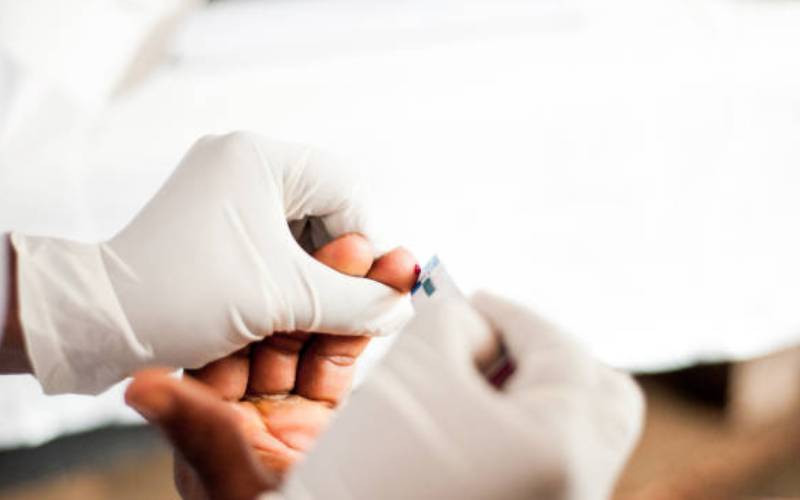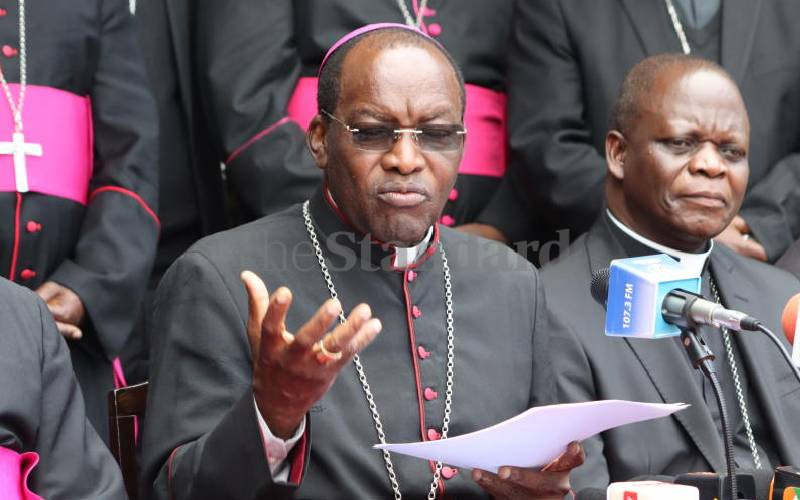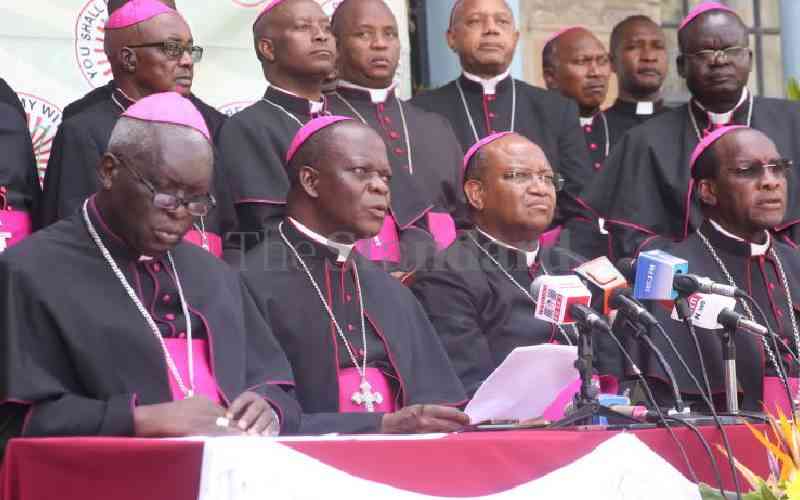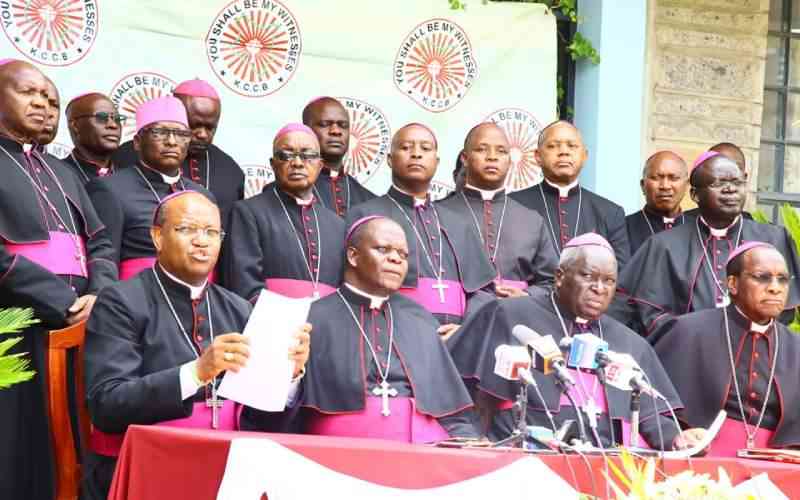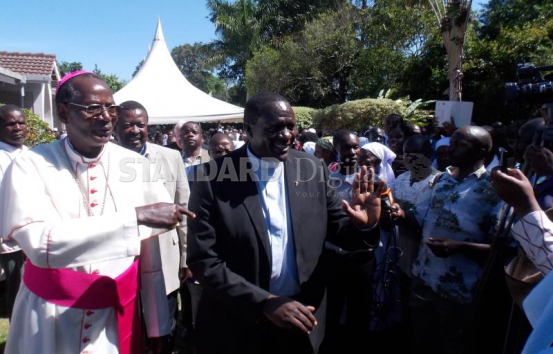
After five decades of service to the church, Bishop Phillip Sulumeti’s prayers to retire from the pulpit, have finally been answered. This coming Saturday, President Uhuru Kenyatta is expected to join the Catholic faithful in bidding farewell to the long serving Bishop of Kakamega Diocese, who is also credited with spearheading the constitutional review process.
The ceremony is expected to be huge and emotional, considering the Bishop’s stature, selflessness, development record and spiritual hold onto the people of Western Kenya. Sulumeti’s proud mother, Agnes, will witness the lifetime event.
Owing to ill health, the Bishop had severally requested the Pope for retirement with little success: “I have had three life threatening operations – one in Nairobi Hospital, another in Rome for a burst appendicitis and the other in South Africa. After the operation in Rome in 1994, I did present my resignation as Bishop to Pope John Paul II.”
But the late Pope refused to let him go: “He told me I must reach Calvary as our blessed Lord Jesus Christ did. That sometimes, it is good for a diocese to have a sickly bishop.”
Sulumeti’s wish to retire was also rejected by Pope Benedict XVI, who himself surprisingly resigned as Pope on February 28, 2013.
Household name
“My resignation was only accepted when I turned 75 and I presented another resignation. This time it was accepted,” he told The Standard On Sunday.
Sulumeti is a household name in the region, with a chain of learning institutions named after him. Born on August 15, 1937 in Kotur Village, Chakol division of Busia County, the Bishop has contributed greatly in the field of education.
And he has not done this alone. Residents of Busia, Bungoma, Kakamega and Vihiga counties are all too familiar with the contribution of his siblings, including Ijaiti Aluku, a onetime principal of St Peter’s Mumias Boys High School and TSC commissioner, and Sister Phillipa Sulumeti, a nun and present day head of St Joseph Academy in Kakamega town.
For years, the Sulumetis have served Kenyans diligently and presided over phenomenal growth in the education sector. Now the older Sulumeti officially retires next Saturday and acquires the new title of Bishop Emeritus (retired).
The soft spoken Bishop joins five other long serving men of cloth in retirement, including Ndingi Mwana a Nzeki (formerly Nakuru/Nairobi), Colin Davies (Ngong), Silas Mugambi (Meru), Ambrose Ravasi (Marsabit) and John Njenga (Eldoret/Mombasa).
Sulumeti first announced his retirement on November 24, 2012 to a congregation at the Bishop Stam Pastoral Centre in Kakamega. But this wish only became a reality after Pope Francis announced his replacement in December last year. Fr Joseph Obanyi Sagwe, a former Vicar General at the Catholic Diocese of Kisii, will on Saturday be consecrated as the second bishop of Kakamega Diocese.
A former student of St Peter’s Minor Seminary, Bishop Sulumeti undertook his studies in Philosophy and Divinity in Kenya, and Rome, Italy, where he studied church law. He is one of the best canon lawyers in Kenya and the Catholic Church worldwide.
Amani Coalition leader, Musalia Mudavadi, says the Bishop’s expertise came to play during the Bomas Conference on the New Constitution in 2006: “He was a sober voice during the Constitution making process. A moderator per excellence. His experience in canon law helped moderate on clauses related to religion. He oozed commitment even when many took partisan positions.”
Stay informed. Subscribe to our newsletter
Sulumeti, who was ordained priest on Mashujaa Day (June 1) of 1966 – a crucial political calendar day in Kenya – served as the chair of the first committee on the review of the constitution, which included the late Dr Ooki Ombaka, the late Anglican Bishop David Gitari and Mbeere South MP Mutava Musyimi.
The Bomas process was a highly politically charged affair, but somehow the Bishop maneuvered his way through. At some point, then Vice President Moody Awori and former Justice and Constitutional Affairs Minister Kiraitu Murungi, led delegates aligned to the Government out of the discussions.
“Unless the Sulumeti report is debated, amended and adopted; unless the votes that have been taken before are declared null and void, and unless (a) secret ballot is adopted as the method of voting, we are withdrawing from this conference,” Murungi warned.
Sharp sermons
Sulumeti was ordained Bishop of Kisumu on August 20, 1972 by Pope Paul VI. He grew up under the tutelage of Bishop John De Reeper perhaps, just like the Biblical Moses did under the Pharaoh’s, learning the ropes of how to shepherd his flock.
He served four years as auxiliary to Bishop De Reeper, two years as third Bishop of Kisumu and 37 years as the first Bishop of Kakamega, where he was transferred to on February 28, 1978.
The Diocese of Kakamega was formerly part of the Diocese of Kisumu, from which it was separated on February 27, 1978. As bishop, Sulumeti has seen the church grow from a handful priests to the current 116 serving more than one million faithful in Kakamega and Vihiga counties.
The bishop will be missed most by the Catholic faithful for his sharp and well researched sermons. He diligently researched his subject before he spoke to a congregation whether at a church or a public function.
Under Sulumeti, over 40 parishes were constructed, each with at least two priests.
He has overseen construction of a pastoral centre, two hospitals - St Elizabeth Mukumu and St Mary’s Mumias. He has helped put up 280 nursery schools, 256 primary schools, 134 secondary schools including Mukumu Girls, Eregi Teachers College and 15 polytechnics.
The church has put up a school for the deaf, and 18 primary schools for the physically handicapped, 12 health centres, and a school of nursing among other noble activities.
He worked closely with former President Moi, especially in enhancing education in Western region. Other political leaders he worked with include the late Moses Mudavadi, Burundi Nabwera, the late Elijah Mwangale, Martin Shikuku, Joshua Angatia and Wasike Ndombi among others.
“President Moi did a lot in terms of fundraising for schools. Some of the learning institutions you see are in existence partly because of the President’s harambee spirit,” he remarked. He also acknowledges working with President Kibaki.
 The Standard Group Plc is a
multi-media organization with investments in media platforms spanning newspaper
print operations, television, radio broadcasting, digital and online services. The
Standard Group is recognized as a leading multi-media house in Kenya with a key
influence in matters of national and international interest.
The Standard Group Plc is a
multi-media organization with investments in media platforms spanning newspaper
print operations, television, radio broadcasting, digital and online services. The
Standard Group is recognized as a leading multi-media house in Kenya with a key
influence in matters of national and international interest.
 The Standard Group Plc is a
multi-media organization with investments in media platforms spanning newspaper
print operations, television, radio broadcasting, digital and online services. The
Standard Group is recognized as a leading multi-media house in Kenya with a key
influence in matters of national and international interest.
The Standard Group Plc is a
multi-media organization with investments in media platforms spanning newspaper
print operations, television, radio broadcasting, digital and online services. The
Standard Group is recognized as a leading multi-media house in Kenya with a key
influence in matters of national and international interest.


